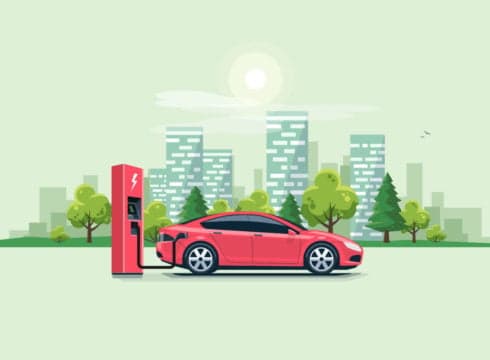The directive were issued by the Ministry of Housing and Urban Affairs
Buildings to provide open metering and on the spot payment options for visitors
Restaurants will have to reserve space of charging kiosks
Inc42 Daily Brief
Stay Ahead With Daily News & Analysis on India’s Tech & Startup Economy
In a bid to prepare for greater adoption of electric vehicles in India, the Ministry of Housing and Urban Affairs has reportedly released new guidelines directing residential and commercial buildings to allot about 20% of their parking space for electric vehicle charging infrastructure.
Further, the government has also suggested connecting the metering and payments of bills with the house owner’s monthly maintenance bills. The buildings are also to provide open metering and on the spot payment options for visitors, those not residing in the building.
According to the rules laid down by the ministry’s department of town and country planning, as an addition to Model Building Bye-Laws, 2016 and Urban and Regional Development Plan Formulation and Implementation Guidelines, 2014, the electric vehicle charging infrastructure is mandatory in certain kinds of buildings and establishments.
The rules also directed that buildings will have to arrange facilities for additional power load so as to ensure that all the charging points can operate simultaneously.
Some of the other guidelines introduced by the ministry are:
- There has to be one charging station every three kilometres in cities
- Charging stations at every 25 km on both sides of highways
- The electricity supply tariff at public charging stations should not exceed the average cost of supply plus 15%
- State government are to decide on a price ceiling on public charging station service charges
- Eateries will have to reserve space of charging kiosks
Electric Mobility Push In India
Though India’s electric vehicle policy is not yet clear, the government has been taking several initiatives to achieve its target of electric vehicles accounting for at least 30% of all the new vehicle registrations by 2030.
Along with the central government, the state governments are also gearing up to develop electric vehicle infrastructure in India. The state government of Goa recently signed an agreement with the National Thermal Power Corporation Ltd (NTPC) for procuring 100 electric buses and setting up charging stations at all major bus stands across the state.
Apart from government, Bengaluru-based cab sharing platfom Ola is also looking to offer electric vehicle services on its platform. Last year, the company had launched its ‘Mission: Electric’ to deploy10K e-rickshaws and electric auto-rickshaws in its service within 12 months.
Recently, reports stated that Tata Motors is also looking to make a strong presence in the electric vehicle space and is thus working with other Tata companies such as Tata Capital and Tata Power to develop the electric vehicle ecosystem in the country.
[The development was reported by ET]
{{#name}}{{name}}{{/name}}{{^name}}-{{/name}}
{{#description}}{{description}}...{{/description}}{{^description}}-{{/description}}
Note: We at Inc42 take our ethics very seriously. More information about it can be found here.


